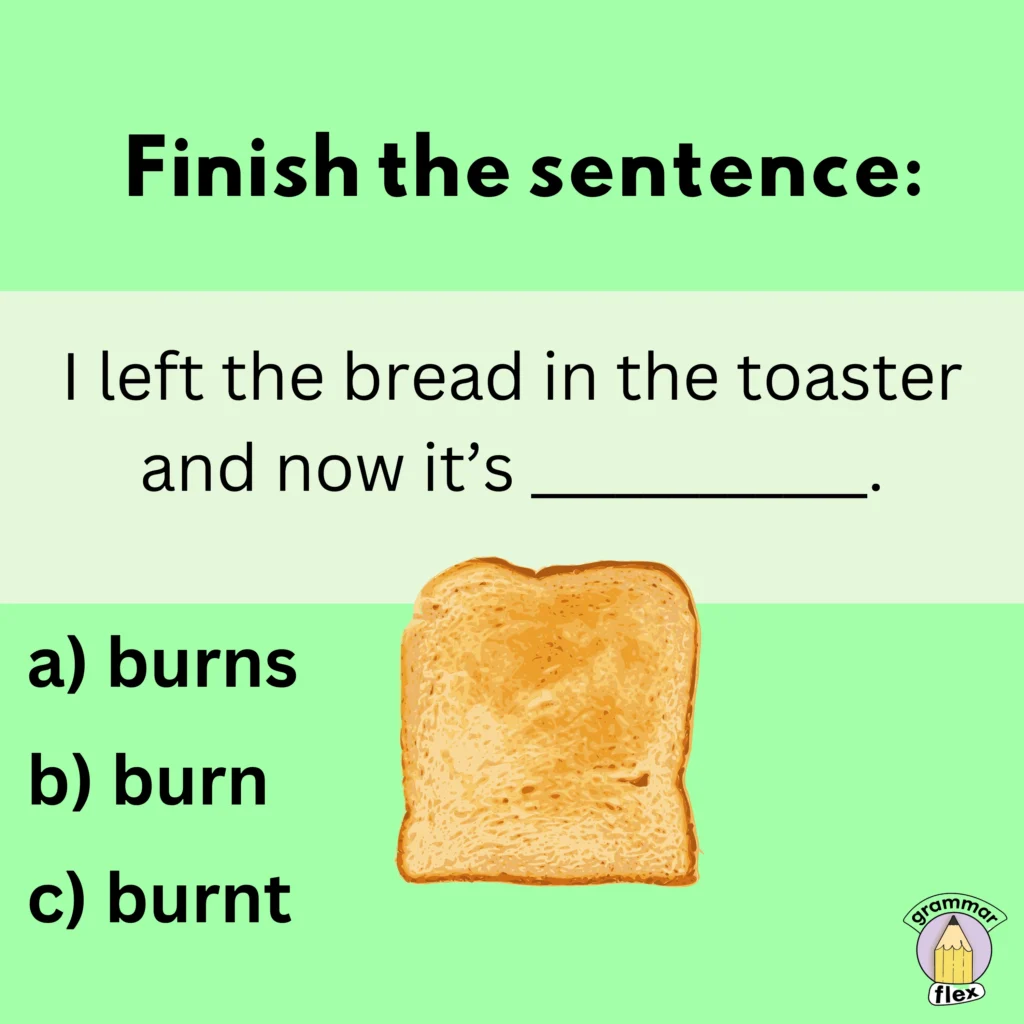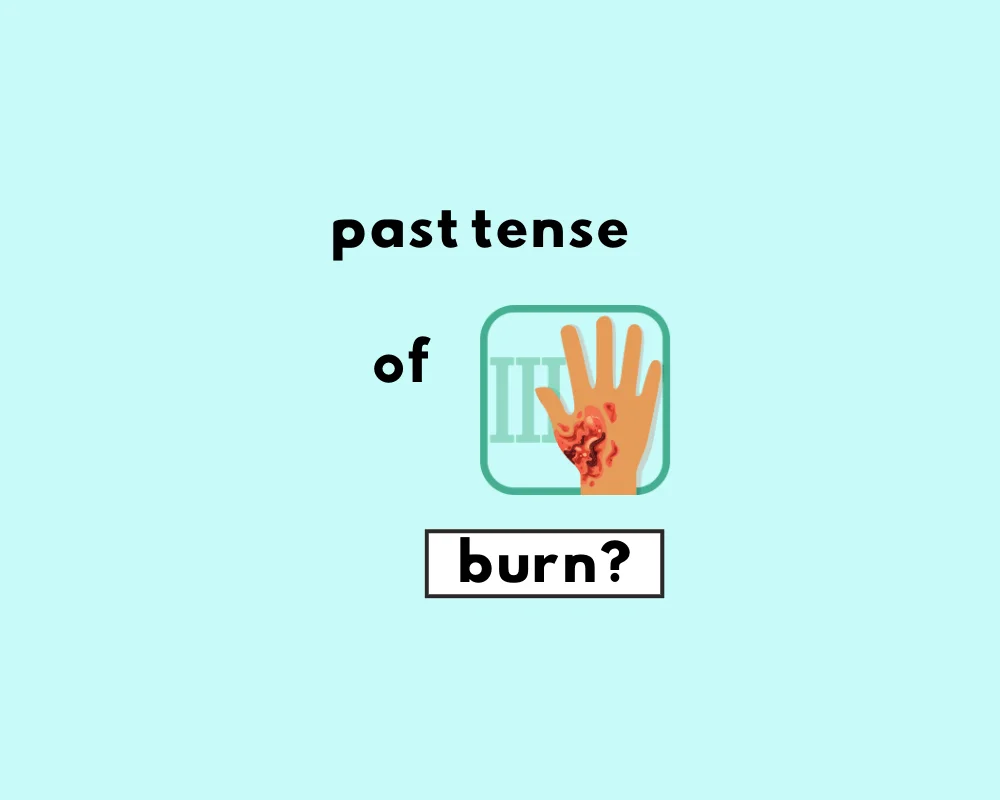
Contents
Toggle
What’s the past tense of “burn”?
Both burned and burnt are correct past tenses of burn, which refers to a state or event when someone/something is on fire; or to destroy or injure someone/something by heat or fire.
- British English uses burned and burnt both as the past tense and adjective forms.
- US English uses burned as the past tense verb form; as an adjective, both burned and burnt are common.
Forms of the verb “burn”
| present | past | future | |
| simple | I burn | I burned/burnt | I will burn |
| continuous | I am burning | I was burning | I will be burning |
| perfect | I have burned/burnt | I had burned/burnt | I will have burned/burnt |
| perfect continuous | I have been burning | I had been burning | I will have been burning |
Is “burned”/”burnt” regular or irregular?
Burned takes the regular verb conjugation with the suffix “ed”. Burnt is the irregular verb form. Generally speaking, the difference in use depends on geography.
| Tense | Sentence examples |
| Present tense | He stood and watched the fire burn. |
| Present continuous | A welcoming fire was burning in the fireplace. |
| Past tense | I burnt/burned the toast. |
| Future tense | Fresh leaves will burn slowly with billows of smoke. |
| Past perfect | He had burnt all the documents before the police got there. |
Burn, which means “(of a fire) produce flames and heat while consuming a material such as coal or wood.”, has two accepted past tense and past participle forms: burnt and burned. Burnt obviously ends in something other than -ed, and so it’s treated as irregular in English. Burned, on the other hand, adheres to the standard rule of verb conjugation to the past tense and past participle form by adding -ed to the end.
Other irregular verbs like “burn”
| base verb | past tense | past participle |
| dream | dreamed/dreamt | dreamed/dreamt |
| burn | burned/burnt | burned/burnt |
| sleep | slept | slept |
| leap | leapt/leaped | leapt/leaped |
| lean | leant/leaned | leant/leaned |
| smell | smelled/smelt | smelt/smelled |
Sentence example with “burn” (present tense)
Fresh leaves will burn slowly with billows of smoke. (future tense)
A welcoming fire was burning in the fireplace. (present continuous)
Don’t burn your bridges behind you.
He stood and watched it burn, feeling as if a part of him burned with it.
Tom burns both wood and coal in his stove. (third-person present singular)
Example sentences with burned/burnt (past tense)
This perfume smells like burnt cotton candy. (adjective)
I burned my hand on the stove yesterday.
He accidentally burned the cake while baking it.
The forest fire burned for several days before it was finally extinguished.
She burnt her hair while trying to light a candle.
Sentences with burnt/burned (past participle)
The toast was burnt to a crisp.
She had burnt her hand on the hot stove while getting dinner prepared.
The house had burnt down before the firefighters arrived.
He had burnt all the documents before the police got there.
She had been burnt before in the past, and didn’t want it to happen again.
Phrases with the word burn
| phrase | meaning |
|---|---|
| to burn one’s bridges | to do something that cannot be easily undone or reversed in the future. |
| brain-burned | displaying the adverse effects of drug use, especially cognitive impairment. |
| slow burn | a gradual development that increases in strength or power over time. |
| to be burned out | to be tired/worn out from overwork. |
| burn (something or someone) to a cinder | for something to be burned badly. |
| burn a hole in one’s pocket | suggesting that the person with the money feels the need to spend it quickly. |
| burn notice | said of something that’s being disavowed. |
| to burn one’s boats/bridges | to squander one’s relationships/business connections. |
| burn some clock | to use up some amount of time. |
| burn both ends of the candle | to overwork yourself. |
| burn not your house to fright the mouse away | don’t overreact to minor problems. |
| freezer burn | said of food that’s been in the freezer for too long and it tastes bad. |
| burn the midnight oil | to stay up late working on a task or project. |
| to fiddle while Rome burns | to take little to no productive action during a crisis. |
| to have money to burn | saying you have money to spend. |
The etymology of burn
From etymology online on burn (v.):
early 12c., brennen, “be on fire, be consumed by fire; be inflamed with passion or desire, be ardent; destroy (something) with fire, expose to the action of fire, roast, broil, toast; burn (something) in cooking.”
Learn more about verbs
- What are regular and irregular verbs?
- Transitive and intransitive verbs
- What are verbs?
- What’re personal pronouns?
- What’s the difference between they’re, their, and there?
- Whose vs who’s?
Sources
- Grammarist.com, burnt/burned.
- Etymonline, burn.










